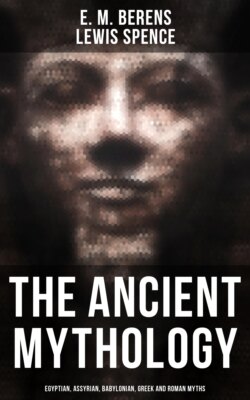Читать книгу The Ancient Mythology: Egyptian, Assyrian, Babylonian, Greek and Roman Myths - Lewis Spence - Страница 44
На сайте Литреса книга снята с продажи.
Spirits and Gods
ОглавлениеSpirits swarmed in ancient Babylonia, as the reader will observe when he comes to peruse the chapter dealing with the magical ideas of the race. And here it is important to note that the determinative or symbolic written sign for 'spirit' is the same as that for 'god.' Thus the god and the spirit must in Babylonia have had a common descent. The manner in which we can distinguish between a god and a spirit, however, is simple. Lists of the 'official' gods are provided in the historical texts, whereas spirits and demons are not included therein. But this is not to say that no attempt had been made to systematize the belief in spirits in Babylonia, for just as the great gods of the universe were apportioned their several offices, so were the spirits allotted almost exactly similar powers. Thus the Annunaki were perhaps regarded as the spirits of earth and the Igigi as spirits of heaven. So, at least, are they designated in an inscription of Rammannirari I. The grouping evidently survived from animistic times, when perhaps the spirits which are embraced in these two classes were the only 'gods' of the Babylonians or Sumerians, and from whose ranks some of the great gods of future times may have been evolved. In any case they belong to a very early period in the Babylonian religion and play no unimportant part in it almost to the end. The god Anu, the most ancient of the Babylonian deities, was regarded as the father of both companies, but other gods make use of their services. They do not appear to be well disposed to humanity. The Assyrian kings were wont to invoke them when they desired to inculcate a fear of their majesty in the people, and from this it may be inferred that they were objects of peculiar fear to the lower orders of the population—for the people often cling to the elder cults and the elder pantheons despite the innovations of ecclesiastical politicians, or the religious eccentricities of kings. There can, however, be no doubt as to the truly animistic character of early Babylonian religion. Thus in the early inscriptions one reads of the spirits of various kinds of diseases, the spirit of the south wind, the spirits of the mist, and so forth. The bit-ili or sacred stones marking the residence of a god were probably a link between the fetish and the idol, remaining even after the fully developed idol had been evolved.
